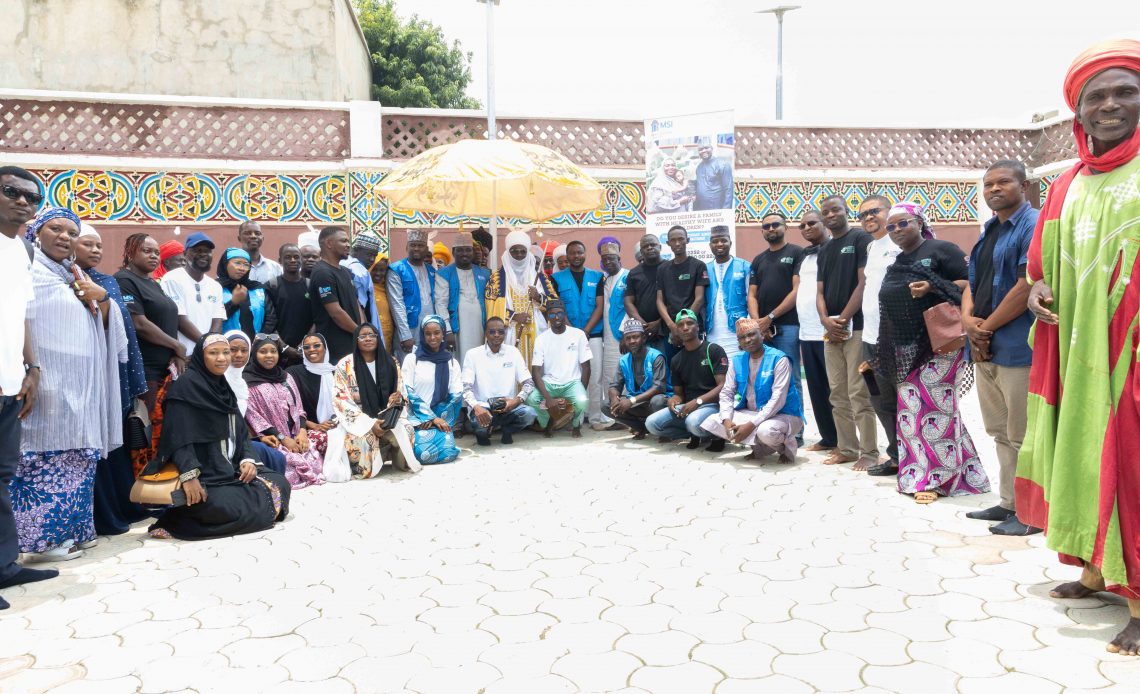Hadiza Mohammed and Mahdi Garba (Lead writers)
In the Rano Emirate of Kano State, the phrase ‘family planning’ is still being fought against, as it is seen as an imposition of western ideologies on the conservative community. Years back, the Emir of Kano, Muhammad Sanusi II, received backlash from residents of the state after he called on Nigerian authorities to adopt and enforce strict family planning laws across the country. Thereafter, child spacing is now the term that is used to describe family planning in the state.
In August 2025, a team of 20 journalists from newsrooms covering various northern Nigeria visited the custodian of the 300-year emirate as part of a reporting trip facilitated by Nigeria Health Watch in partnership with MSI Nigeria Reproductive Choices (MSI Nigeria) and the Family Planning News Network (FPNN). Ambassador Muhammad Isa Umaru, the Emir of Rano explained how his voice with others has continued to influence the advancement of child spacing.
The Emir noted that under his leadership, the emirate has continued to make efforts to raise awareness, particularly on childbirth spacing, recognising that neglecting this practice has contributed to numerous challenges. “Children who are born in families that do not embrace child spacing do not live a healthy life. After critically looking at calls from organisations, we started by using ward heads to encourage their subjects to embrace child spacing,” he said.
In northern Nigeria, cultural and religious beliefs remain significant barriers to the uptake of family planning, particularly modern contraceptive methods. Research conducted in Zamfara, Katsina and Gombe states found that many communities believe having many children honors God and secures religious continuity, reinforcing the perception that children are a blessing and should not be limited.

of the field trip visited his palace in Rano, Kano State. Image credit: Nigeria Health Watch
This belief is often amplified by the influence of patriarchal norms, where women often have limited autonomy over reproductive choices, with husbands or elders making key health-related decisions.
The Emir further added that, “we use Imams [Islamic religious heads] to propagate the messages in their sermons during Friday prayers and call on families to embrace it for the betterment of the health of their newborns and their mothers. We also use the Fulani traditional rulers, especially in villages and hamlets to inform people about the importance of child spacing. We are trying to do our best to send messages. Glory be to God; our people are gradually embracing it. Couples even go to hospitals now to make inquiries about the commodities like [injectables], implants, that we provide to meet their reproductive needs.”
Other challenging misconceptions
Misconceptions have shaped attitudes toward child spacing in northern Nigeria. Many families still believe that contraceptives cause infertility, damage the womb, or encourage promiscuity. These misconceptions are often reinforced by patriarchal norms, where men who often disapprove of family planning dominate women’s reproductive health decisions.
Studies indicate that up to 65% of men in some communities in the region consider contraception unnecessary or even harmful. This leaves women with little agency to make informed health choices.
Kano State has one of the highest total fertility rates in Nigeria, averaging about 6.8 births per woman. With an estimated 1,000 births each day, the state is experiencing rapid population growth that places enormous strain on healthcare services and resources. Overcrowded facilities, limited skilled birth attendants, and the fact that 74% of women deliver at home further undermine maternal and child health.
However, change is possible, and the story of Rano Emirate offers a powerful example. “Our men have accepted different methods of child spacing, and this has helped reduce the situation where families have more children than they can cater to,” “Today, healthier mothers, stronger households, and children better-cared-for are tangible results of this cultural shift” the Emir explained to journalists during the Solutions Journalism field trip. By confronting misconceptions with trusted voices and lived experiences, Rano demonstrates how contextualising information and relating it to community dynamics can dismantle myths and drive healthier choices for entire communities.

Traditional voices, modern solutions
Between 2018 and 2023, Kano State recorded significant progress in the use of modern contraceptive methods, with the Modern Contraceptive Prevalence Rate (mCPR) increasing from 5% to 10.6%. However, to sustain and accelerate this progress, forward-thinking traditional rulers such as the Emir of Rano must be more actively involved in advocacy and community engagement ensuring a holistic approach to increasing mCPR.
Nigeria has set a target to increase its mCPR to 27% by 2030, up from the current 12%. Efforts by the private sector, such as PSHAN’s Adopt-a-Health Facility Project, can complement government commitments by expanding access, strengthening policy frameworks, and mobilising domestic funding.
To overcome cultural barriers and increase uptake, it is essential to engage traditional and religious leaders. Their trusted voices can help normalise family planning and child spacing, while also mobilising community support toward achieving the 2030 goal.
The media also has a vital role to play in spotlighting stories like Rano’s, helping to counter misconceptions and inspire replication in other communities. Most importantly, families must begin to view family planning and child spacing not as a taboo, but as a health decision that secures the wellbeing of mothers, strengthens households, and gives children a better chance at life.


